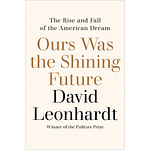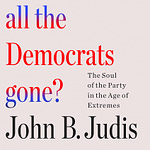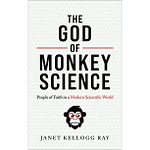This is my third and final post on John Inazu's book Learning to Disagree: The Surprising Path to Navigating Differences with Empathy and Respect, which was released April 2, 2024. Inazu teaches on criminal law, law and religion and the First Amendment at Washington University in St. Louis. He is an expert on religious freedom. And he is a senior fellow with Interfaith America. The first post on why I chose to read it is here. The second post, laying out the core components of the book, is here.
In March, I went through Mustafa Suleyman’s The Coming Wave.
In February, I went through Nick Troiano’s The Primary Solution.
In January, I went through Michael Wear’s The Spirit of Our Politics.
The book of the month schedule is here.
So far this year, on the Border Stalkers Substack I've gone through four books, and this month I'm talking to the author of the fourth, which is about disagreement.
That word sounds so tame, doesn't it, compared to the reality of what it feels like to be in an argument?
Disagreement. It seems like such a civil thing. Instead, conflict usually feels like a tornado inside us, even if it's something simple like what movie to watch or where to go for dinner.
When we are caught up in disagreement where we feel under threat — when our reputation, our well being or even our physical safety might be at risk — that makes it very hard to think straight.
And then there are the times when we feel emboldened to go on the attack, when we are sure of our rightness or righteousness, and we are outraged by the mere existence of arguments against our point of view and those who advance them. Again, our metabolism often races ahead of our reason.
Into this fray comes John Inazu's new book, Learning to Disagree: The Surprising Path to Navigating Differences with Empathy and Respect. John teaches on criminal law, law and religion and the First Amendment at Washington University in St. Louis. He is an expert on religious freedom. And he is a senior fellow with Interfaith America. He is also a former Air Force officer who was working in the Pentagon on 9/11 when a hijacked airliner hit the other side of that massive building. And finally, he is the son of Japanese-American father who was born in an internment camp during World War II, where his American citizen grandparents were incarcerated for three years simply because of their ethnic heritage.
John's book is structured around the rhythm of a law school year. The reason, he says, is because he thinks the law has something to teach us about how to approach disagreement.
We talk here about why he thinks his book has surprising advice. We also spend a lot of time talking about the protests on college campuses about the war in Gaza, which have reached a fever pitch over the past week, and what his book offers to that incredibly intense disagreement. We actually kept coming back to the issue of American universities and their purpose and mission. It was a great conversation. I hope you enjoy it.
For those who listen to podcasts on Apple podcasts or other platforms like it, this interview will be posted there in the next day or two. The link for the Apple podcast version of the show is here.
Here is a partial transcript of our interview.
Jon Ward: What is surprising about the path you lay out here?
John Inazu: You know, a couple of things. One is that it turns out that some of the things we all know but are hard to put into practice are what we need. Listening and empathy and those sorts of tools we learn when we're young and easily forget. And it's maybe surprising that in the midst of all of these current challenges that there's some pretty basic answers we need to get back to.
The other surprising piece of this and where I map out the book is that I think there's a case to be made that law actually has something to teach all of us about how to navigate our differences. And I think a lot of people think of lawyers as those people who argue and are stubborn and do not actually engage well.
And certainly some lawyers have earned that reputation. But the best lawyering is actually the lawyering that takes you to a kind of empathy and respect for the other side. And so what's surprising about stepping into or getting a peek into the experience of law school and legal education is that there's actually something for all of us to take away from that to the Thanksgiving dinner table or the neighborhood picnic or the workplace as we encounter our own differences and disagreements.
Jon Ward: So much of modern culture, I think, really values, obviously, authenticity and sincerity. And sometimes I think people feel like structure and formality get in the way of those other values. Do you see that on college campuses?
John Inazu: Some of them do some of them come in with different expectations … One of the challenges and opportunities of teaching is you really do bring students who are new and you have to inculcate them into a different way of thinking and a different mode of being.
But the other thing I was thinking about as you were asking that question is how law has both structure but also creativity.
We teach a class to undergraduates called Law, Race, and Design. And in the teaching of that class, we remind ourselves … that design is centered in creativity and flexibility, but also it only works because there are rules in place.
Law is structure and rule-based, but the best lawyering is going to be creative and imaginative. And it's actually when you step outside of the initial sense of your discipline or your practice and realize, ‘Oh, there's this other whole dimension to what's going on,’ that's when the really best practitioners step up.
And so I think law has, yes, structures and rules and also real opportunities.
Jon Ward: I wanted to move to something in the news, which is the protests on college campuses over the past several days … What would you say if you sat down and did a mediation between some of these students?
John Inazu: Well, first of all, I would say you need to get a professional mediator, not me. But I think this is such an important example and test case of the kinds of things I'm talking about. But it is so complex.
And so I think where I would start is by reminding people that they are part of a particular institution that has a purpose and set of values and set of norms and — in the case of a university — that has to be for the sake of the community of students, learners and teachers who are there and that has to be for an educational purpose that is intended to think more deeply and carefully about hard issues in ways that are not possible in other institutions.
So when these protests come up, often one of the first claims made is, well, the First Amendment, I can say whatever I want and do whatever I want. That's largely true, although some universities will have rules.
But if you started by thinking about being a responsible member of a community, you wouldn't be yelling and screaming at fellow students because that doesn't actually advance the purpose of the community or the institution that houses it. You wouldn't be yelling the points you're trying to make because you would be committed to a particular mode of discourse that lets you talk through really complex issues.
Now, that doesn't mean you never protest. I think there's an important role for protest some of the time, but be strategic about what the protest is about and what your goals are and the community and coalitions you'll need on the other side of that protest. And that's what I see is really lacking right now.
And there's also just right now leadership challenges of leaders who don't actually know how to name the purpose, mission, and values of their institutions in a way that could actually call people together rather than divide people further.
Jon Ward: Let's talk about that for a second. I mean, when you talk about leadership that does cast a vision for this question of, ‘Why are we here?’, one of the examples that comes to mind is the dean of the Stanford Law School, and her memo in response to the shouting down of, I believe his name was Kyle Duncan, a conservative judge who spoke to the Federalist Society chapter on campus last year.
She wrote a memo, 10 pages or so, where she really dug deep into what is the purpose and mission of the Stanford Law School and kind of went from there. But you're not seeing that at some of these other schools, is that correct?
John Inazu: I think that's part of it. And even the Stanford example, which I think was a good one, if you're having to articulate the principles of your institution in the crisis moment, it's almost too late.
So one of the reasons we're seeing so much blow up right now on these campuses is for years and years, these sort of technocratic, bureaucratic leadership have been unable to cast a compelling vision of what the purpose of the place is, or why people should even be there.
Contrast this with some other lesser known colleges and universities that have a much stronger sense of mission and identity, and you're seeing fewer blow-ups there. It's not that the issues don't exist, but there's a sense in which people are bought into a shared community vision. And that takes time and liturgies and practices and a repeated sense of who we are and why we're here, especially when the student population changes over so quickly.
And if all you're trying to do is run a massive wealthy institution and try to be better than Harvard, it's going to be very hard to continue to convey the the purpose, meaning, and values of your institution, especially to new stakeholders.
Jon Ward: What would be an example or two of some of these other places that are doing a good job of this?
John Inazu: Well, I mean, I'll just mention one where I was just visiting, Berry College in Rome, Georgia. I didn't know much about the school. It's a small liberal arts school with maybe 2,200 students. But what intrigues me about that place, it has a kind of religious Christian identity, but not in a creedal way that you might see at a place like Wheaton. It's quite open and has quite a few students, different constituencies at all levels of the institution.
But one thing that stood out to me is maybe 80 or 90% of the students work and they have jobs as part of the university and the university owns a ton of land and they do some farming and some livestock and some tree management and other people work in the cafeteria or for professors. But just the fact that the overwhelming majority of the students have jobs, that contributes to the culture of the place and it gives them a distinctive identity.
And when the president stands up and says, ‘Here's who we are,’ there's a message and an audience that understands that message. And I couldn't begin to name something similar at Columbia, for example.
Jon Ward: Any other examples that come to mind?
John Inazu: Sure. I mean, the service academies, right? People know what the mission is there.
I think some, but not all, flagship state schools. There are a series of the flagship states that are just trying to be nationally known and the best, and they've kind of, I would say, lost their mission.
But there are some flagship states that say, no, our purpose is to serve the community and the citizens and the leaders of this state.
There are some regional schools that know the supply side of their student population, and they know that most of their graduates are going to be nurses and teachers and community workers in the area.
And that's a really important mission for sort of sustaining the social fabric.
There are some religious schools that actually can name, with coherence, what their identity is. So yeah, I think there are a number out there, but my larger worry is that higher ed more generally is trending toward this: let's make a lot of money, let's get the best students, let's rise in the rankings, whatever that means, and they're losing their distinctive purpose and identity.
















Higher ed has lost sight of mission and purpose, John Inazu says